Putin tests Europe’s resolve as calls mount for Coalition of the Willing troop deployment in Ukraine
EXCLUSIVE: Putin is testing Europe’s resolve as pressure mounts for Coalition of the Willing to send in troops to Ukraine.
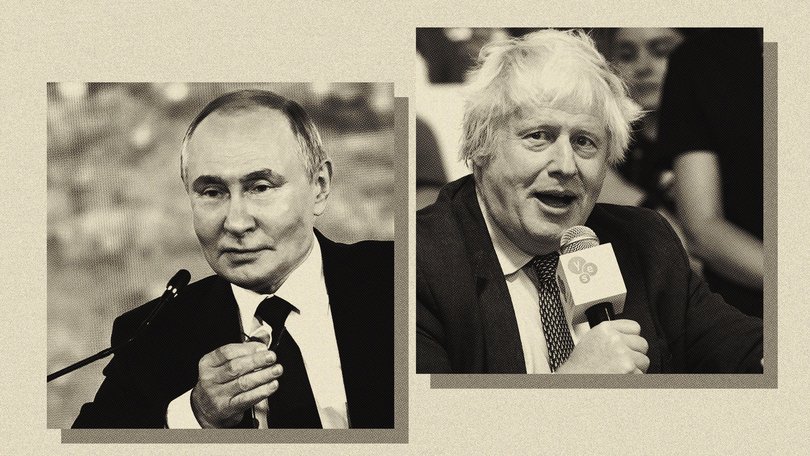
Donald Trump’s former envoy to Ukraine has warned that NATO has lost its ability to deter Russia’s President Vladimir Putin and backed calls for Europe to deploy the Coalition of the Willing now and not wait for a peace deal.
Mr Volker, a widely respected US diplomat, served as US Ambassador to NATO and was President Donald Trump’s special representative to Ukraine until 2019.
Speaking to the Latika Takes podcast on the sidelines of the Yalta European Strategy (YES) Conference in Kyiv, Mr Volker said that the defensive alliance had lost its ability to deter.
Sign up to The Nightly's newsletters.
Get the first look at the digital newspaper, curated daily stories and breaking headlines delivered to your inbox.
By continuing you agree to our Terms and Privacy Policy.“We have definitely eroded, if not, we’ve completely lost deterrence,” Mr Volker said.
“Because deterrence is based on the notion that you have the capability and the will to act.
“And I think Putin is constantly testing our will, and we keep coming up short.”
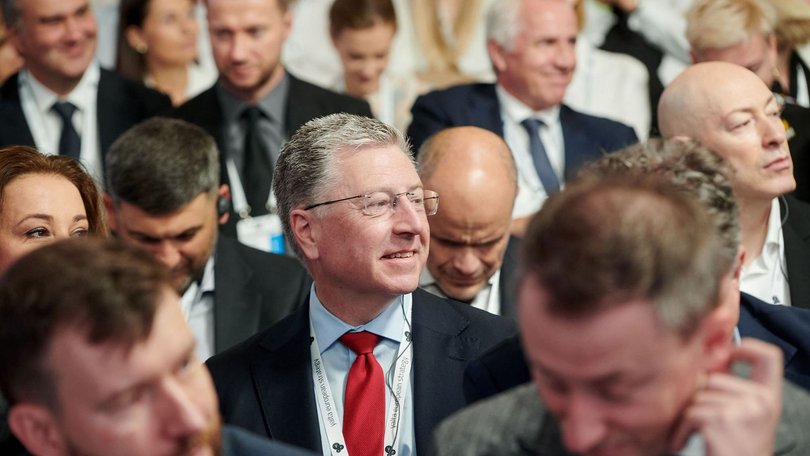
Mr Volker said the NATO response to Russian drones invading Polish airspace last week required a firmer response.
Polish, Italian and Dutch pilots operated fighter jets to knock down a handful of the 19 drones over Poland, which NATO leaders hailed as a success. Romania then reported that a Russian drone had entered its airspace days later.
On Tuesday, the UK became the latest NATO country to deploy fighter jets to the region, as part of a new NATO response to defend the eastern flank.
US President Donald Trump has openly questioned whether Russia deployed the drones deliberately, putting him at odds with Poland, which says the incursion was a test of NATO’s defences.
NATO Secretary-General Mark Rutte has also left open the possibility that the drones entered Polish airspace by mistake, but also said that the incident was reckless and unacceptable regardless.
Mr Volker said that from his experience, half the people in the room determining NATO responses to Russian provocations would play down the matter and say NATO should not escalate or respond militarily.
But he said that Russia’s actions were “a deliberate probing of NATO airspace” to see how NATO reacts and a threat to extend the war in Ukraine to NATO.
“So we need to declare an extended air defence zone, which we do over open water but we should be doing it in Europe now,” Mr Volker said.
“We would need an extended air defence zone of 150 to 200 kilometres, where we will not accept dangerous flying objects in that area.
“And say anything that is within 150 to 200 kilometres of that, that is an unknown and unfriendly object.
“That will require us to work closely with Ukraine and to integrate our intelligence mapping and interception of these things.
“But we should be doing this for the safety of NATO country populations because Vladimir Putin has now shown he is willing to put them at risk.”
Donald Trump’s attempts to end the war in Ukraine continue to elude the US President, nearly a year after his election, despite his infamous boast that he would have it sorted in one day if reinstated in the White House.
Mr Trump insisted that his red-carpet treatment for Vladimir Putin in Alaska last month “accomplished a lot” but said “it takes two to tango also”.
Hinting at a possible meeting with Ukrainian President Volodymyr Zelensky in New York at the United Nations General Assembly next week, Mr Trump added “Zelensky’s got to make a deal and Europe’s got to stop buying oil from Russia”.
Mr Trump and other members of his administration have repeatedly falsely equated Ukraine’s self-defence with Russia’s illegal and unprovoked invasion of the former Soviet Union state.
Mr Volker said that Mr Trump did want peace, but he shed light on why the US President did not force Putin to the negotiating table by giving the Ukrainians more weapons capability.
“I think he genuinely wants peace in Ukraine, but I think the reason he wants peace is so that you can get on with doing business,” Mr Volker said.
“Pushing Russia that hard is creating a confrontation with Russia. And what he really wants is a deal with Russia because he thinks that as soon as there’s a deal, we can make lots of money.
“And so he doesn’t want to throw away that prospect, and that is a wish that Putin is using. He is using Trump.
“He’s exploiting Trump’s desire to have that deal by dangling it while pursuing his real aims, which is the destruction of Ukraine.”
Whilst President Putin has not achieved his aim of taking Kyiv and installing a puppet regime in Ukraine like the one in neighbouring Belarus, he has been supported by North Korea, Iran and China to wage a brutal war of attrition.
His territorial gains are incremental but advancing over Ukraine, because the war has changed into one that is fought primarily with drones.
Russia has used swarms of drones to overwhelm Ukraine’s air defences and attack Ukrainians and civilian targets, such as a pharmaceutical university in central Kharkiv, Ukraine’s second-largest city just 20 kilometres from the Russian border, which was hit on Tuesday in broad daylight.
Officials in Kharkiv have assembled debris from the missiles, rockets and drones that the Russians send to kill innocent Ukrainians as evidence of war crimes.
The Nightly was given a tour of the “Cemetery of Missiles” during a visit to the city on the morning of the strike on the university.
The cemetery’s contents have more than doubled in size in the last two years, in a sign of Russia’s relentless attacks on civilians and cities.
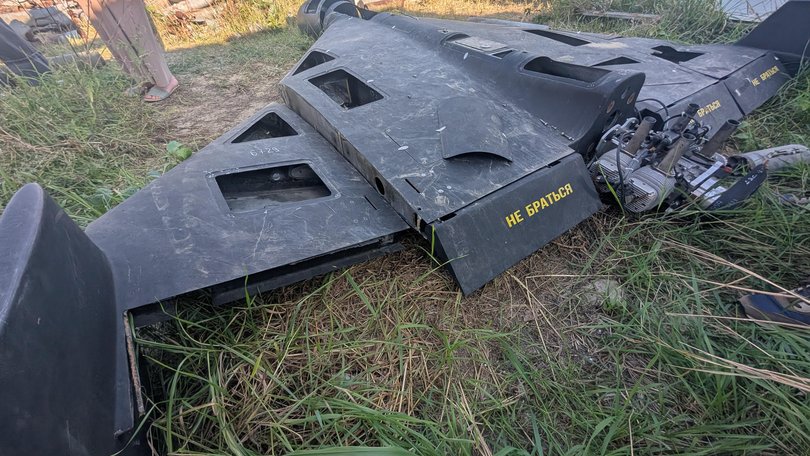
Mr Volker said this could have been ended by 2023 if Mr Trump’s predecessor, Joe Biden, and his national security adviser, Jake Sullivan, had acted with strength.
“I hate to say it because I know both of them and they’re very good people, but they got this wrong,” he said. “We should have responded forcefully, swiftly, with everything possible as quickly as possible.”
“Russia has had three and a half years now to regroup, reorient, wage a different kind of war.
“They could have been pushed back and stopped in the first year, and we could have had a ceasefire then.”
But Mr Volker said that in lieu of a ceasefire, Europe could still act and send its reassurance force into Ukraine now.
This idea, revealed exclusively by The Nightly last week, is being pushed by Boris Johnson who says the 26 countries, including Australia, that have agreed to provide Ukraine security guarantees should deploy today instead of wait for President Putin to agree to a ceasefire.
Asked whether this was a good idea, Mr Volker said the former UK Prime Minister was “totally right”.
“There’s nothing that prevents them from sending troops to Ukraine today,” he said. “There’s no restriction.”
Mr Johnson also attended the conference and challenged Finnish President Alexander Stubb, who fashions himself as a leading Trump-whisperer, to act on the Coalition now, instead of waiting.
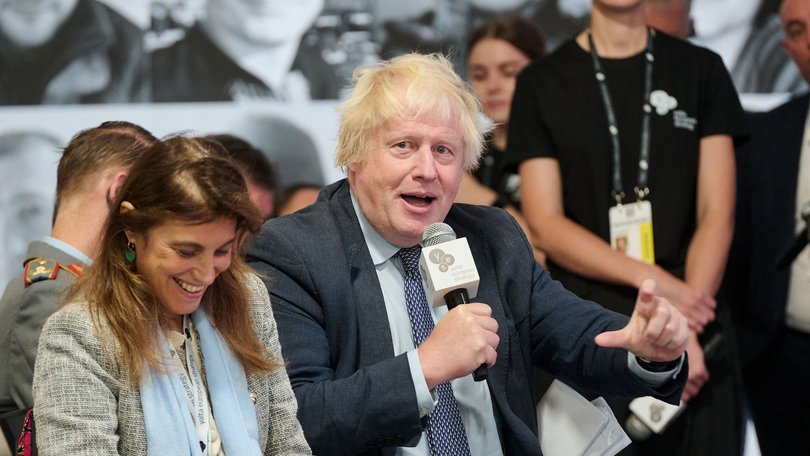
“Everybody’s talking about the security guarantees and a ceasefire and it seems to me there’s a real risk of an endless chicken and egg problem,” Mr Johnson said.
“Because Putin has no interest in a ceasefire, he doesn’t want to make a deal. So why not short-circuit this?
“You’ve got this Coalition of the Willing built up, you’re ready to go, what is the objection to deploying now in the safe parts of Ukraine?
“Why couldn’t the Coalition of the Willing get their boots on the ground now?
“Not in a warfighting capacity, they’re not there to take on the Russians, the Coalition of the Willing.
“They’re there to show that Ukraine has made a geostrategic choice to be part of the Western security architecture and we respect that choice.
Mr Johnson said it was “crazy” that Ukraine’s choice about which troops were allowed on its soil was being outsourced to President Putin.
“It looks like the Coalition is willing but the spirit is weak,” he said.
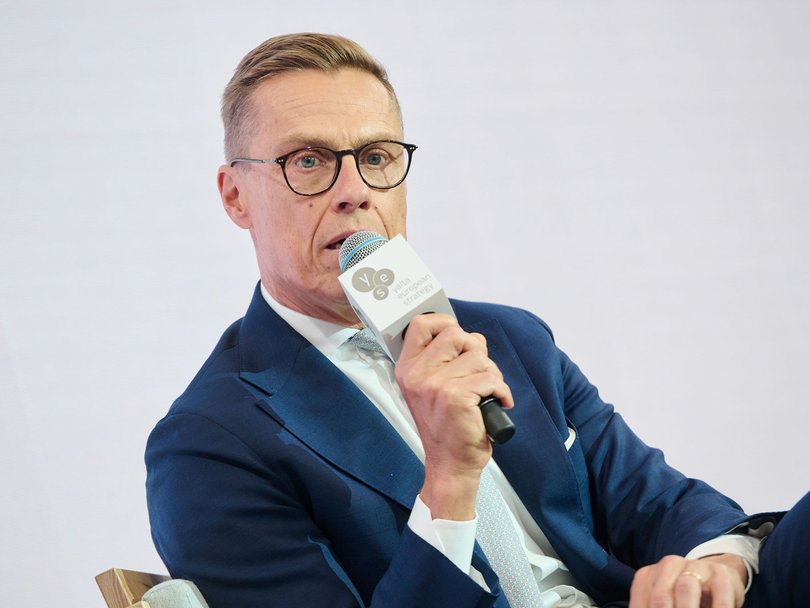
President Stubb rejected Mr Johnson and took a swipe at the former Conservative Party leader’s role in campaigning for the successful Brexit referendum in 2016.
“The starting point of the Coalition of the Willing is to create the deterrence for the day after the war,” Mr Stubb said.
“I kind of want to take this one step at a time.
“The next step is then after the ceasefire to provide the Coalition of the Willing with the military plans that have already been set.
“Then, I’m reluctant to raise this in your presence Mr Johnson, one of the best security guarantees Ukraine could get is EU membership.”
Ukraine’s accession to the European Union will not happen before the end of the decade and NATO membership has been put on the back-burner.
